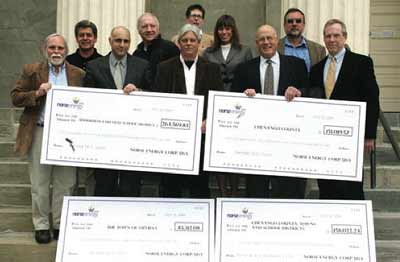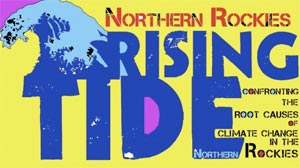Biblio
Norwegian based company with operations in the US. They own and operate pipeline systems in the northeastern US for gathering and transmission of natural gas. The CEO is Øivind Risberg.
NY Senate to Suspend Hydro Fracing Permits; Norse's Program Unaffected
On Aug. 5, 2010, the New York State Senate approved a proposal to suspend hydraulic fracturing of gas reservoirs in New York State until May 15, 2011.
"This proposed bill does not affect Norse's strategy of developing our estimated 500 Bcf Herkimer field. Actually, if anything, it could improve our strategic position as I anticipate a time limited moratorium on hydraulic fracturing shale permits would extend our lease term under the force majeure clause and allow us to hold more land with our ongoing Herkimer activity.
Our Herkimer drilling program is fully financed and as we now get back to drilling on our 3D seismic locations in the second half of the year, we anticipate our reserve based lending to further improve our financial position and allow for an acceleration of our Herkimer activity into 2011," said Øivind Risberg, CEO of Norse Energy.

See: Tyler Murphy and Melissa DeCordova. The Evening Sun. May 14-15, 2010. "Pro-natural gas drilling concerns say:We’re in the money"
Picture on the front page shows Norse Energy Vice President Stephen Keyes, City of Norwich Mayor Joseph Maiurano, Village of Sherburne Mayor Bill Acee, Realtor Bruce Beadle, Town of Smyrna Supervisor James Bays, County Planning Director Donna Jones, Commerce Chenango President Maureen Carpenter, County Treasurer William Evans, County Consultant Steve Palmatier and Nornew spokesman Dennis Holbrook receiving $656,923 worth of "symbolic checks".
The municipality [Norwich, NY] is one of the first in Chenango County to reap the financial benefits of natural gas development on an unprecedented local scale.
Norse Energy Inc., the Norwegian-based parent company of Nornew, has drilled 23 wells in the county, 13 in the Town of Smyrna since 2007.
The check’s amounts were based on the numbers released by the Chenango County Office of Real Property Services on May 1 and reflect the estimated assessed value using last year’s tax rates.
"A faction of Northeast Ohio residents and lawmakers fighting for stricter regulations on oil and gas well drilling are getting outmuscled in the Ohio Senate and are turning their attention to the House. The state's powerful oil and gas industry, Gov. Ted Strickland's administration and lawmakers from outside greater Cleveland have teamed up to produce a set of rules its critics say don't do enough to protect homeowners living near wells."
"Northern Rockies Rising Tide is a chapter of the international, decentralized, grassroots movement Rising Tide. We are based out of Missoula, Montana, USA and work primarily on issues concerning the northern Rocky Mountains bioregion.
Rising Tide is an all-volunteer network of groups and individuals who promote local, community-based solutions to the climate crisis and take direct actions to confront the root causes of climate change. Rising Tide was born out of the conviction that corporate-friendly “solutions” to climate change will not save us and that most government efforts are half-measures at best. We organize through decentralized, local groups that support one another through shared resources, ideas, fundraising and training.
Northern Rockies Rising Tide is committed to stopping the extraction of more fossil fuels and preventing the construction of new fossil fuel infrastructure. Equally important, we believe that we must make a just transition to sustainable ways of living.
Rising Tide’s tactics are diverse and creative, taking a bottom-up approach to connecting the dots between colonialism, corporate power, social justice, biocentrism and the environment. The systems that are destroying the planet are systems rooted in oppression. Combating climate change is not solely a matter of carbon emissions, but of confronting the institutions that destroy communities, cultures and the Earth."
NYC Department of Environmental Protection
Communications & Intergovernmental Affairs. Department of Environmental Protection Calls for Prohibition on Drilling in the New York City Watershed.
Report finds gas drilling poses unacceptable risks to the unfiltered drinking water supply for nine million New Yorkers. Press Release. 12/23/2009.
NYSDEC Main Page on Marcellus Shale.
Hydraulic fracturing of the Marcellus Shale will require large volumes of water to fracture the rocks and produce the desired amount of gas. Each well may use more than one million gallons of water.
See: NYS Dept. of Environmental Conservation (NYSDEC): Bureau of Oil and Gas Regulation
NYSDEC is criticized for not having enough personnel to monitor gas drilling.
There is currently no Section Chief for the Compliance and Enforcement Section of the NYS Dept. of Environmental Conservation (NYSDEC) Bureau of Oil and Gas Regulation. Jack K. Dahl, Director. (518) 402-8056.
See: NYS Dept. of Environmental Conservation (NYSDEC): Draft Supplemental Generic Environmental Impact Statement (dSGEIS) on the Oil, Gas and Solution Mining Regulatory Program
The draft Supplemental Generic Environmental Impact Statement (SGEIS) for potential natural gas drilling activities in the Marcellus Shale formation was available for public review and comment through 12/31/09.
The draft SGEIS supplements the existing Generic Environmental Impact Statement (GEIS) and analyzes the range of potential impacts of shale gas development using horizontal drilling and high-volume hydraulic fracturing.
The draft SGEIS outlines safety measures, protection standards and mitigation strategies that operators would have to follow to obtain permits.
Comments - The public comment period ended on 12/31/09 and the Department is now evaluating the many comments received. Watch this page for updates.
State of New York, Department of Environmental Conservation (NYSDEC). 2009. Draft Supplemental Generic Environmental Impact Statement (SGEIS). (804 pages, PDF, 22.77 MB)
What is wrong with New York in regards to gas drilling?
See: The U.S. Forest Service page below.
In New York, the Finger Lakes National Forest - Projects & Planning page contained no information on Oil and Gas Leasing.
BILL NUMBER:S8129. Passed 48-9. Aug. 3, 2010.
See: Patterson Veto and updates on Marcellus Shale legislation from E2 Law Blog.
See: Solid Shale
Solid info for NYS citizens who want their grandkids to be able to walk on unpolluted ground.
This is the place to read about bills having to do with gas exploration and extraction that are under consideration, and then read what others think about them in the comments (or share your own thoughts!).
See Assembly Bill, A1322c. "An act to amend the environmental conservation law, in relation to environmental protection related to the drilling of oil and gas wells, and providing for the repeal of certain provisions upon expiration thereof".
Pictured in still frame: George Winner, who voted against the Bill.
See: Transcript (PDF 99k)
TITLE OF BILL: An act to suspend hydraulic fracturing; and providing for the repeal of such provisions upon the expiration thereof
PURPOSE OR GENERAL IDEA OF BILL: This bill seeks to place a suspension of any permitting for hydraulic fracturing low permeability natural gas reservoirs, such as the Marcellus and Utica shale formations to ensure adequate review and analysis of the effects of this type of drilling on water quality, air, environmental, safety and public health.
SUMMARY OF SPECIFIC PROVISIONS: This bill suspends the issuance of new permits for the drilling of a well which utilizes the practice of hydraulic fracturing for the purpose of stimulating natural gas or oil in the Marcellus Shale formation.
JUSTIFICATION:
The potential for development of natural gas drilling in the Marcellus Shale formation within New York State has created robust debate involving the interplay between job creation and protection of the environment. Stakeholders both in support and opposition to these developments are aggressively advancing positions that are expansive and highly controversial.
By delaying DEC's ability to issue permits until May 15,2011, this bill will provide the Legislature additional time to assess the true environmental impacts of horizontal drilling and hydraulic fracturing.
This bill will also allow the Legislature to properly deliberate the numerous concerns that have come forward during the public comment period on the Department of Environmental Conservation's draft Supplemental Generic Environmental Impact Statement (draft SGEIS).
The May 15,2011 date also ensures that the Legislature will have ample opportunity to act in the 2011 Legislative Session. Gas drilling carries with it risks of accidents, including blow-outs and hazards related to gas seeping from wells. There are also potential effects on the communities in which shale gas production is located, including traffic, noise, and an influx of transient workers. Air quality, road creation, and habitat destruction all need to be taken into account, but by far the biggest concern is water safety.
The large withdrawals of water required for hydrofracking could disrupt surface and ground water ecosystems, and improper management of drilling and hydrofracking chemicals, drilling waste, and wastewater could pollute surface water and/or groundwater.
Given the complexities of the environmental and policy issues under consideration, the need for a one year suspension on the permitting process for development of natural gas drilling in the Marcellus Shale formation cannot be overstated. This will allow for a thorough, deliberate and unrushed analysis of all factors involved.
PRIOR LEGISLATIVE HISTORY: New bill.
FISCAL IMPLICATIONS: None.
EFFECTIVE DATE: This act shall take effect immediately, and shall expire and be deemed repealed on May 15, 2011.
S8129B Votes
Ayes (48): ADAMS, ADDABBO, ALESI, BONACIC, BRESLIN, DEFRANCISCO, DILAN, DUANE, ESPADA, FARLEY, FLANAGAN, FOLEY, FUSCHILLO, HANNON, HASSELL-THOMPSON, HUNTLEY, JOHNSON C, JOHNSON O, KLEIN, KRUEGER, LARKIN, LAVALLE, LEIBELL, MARCELLINO, MCDONALD, MONTGOMERY, NOZZOLIO, ONORATO, OPPENHEIMER, PADAVAN, PARKER, Peralta, PERKINS, RANZENHOFER, ROBACH, SALAND, SAMPSON, SCHNEIDERMAN, SERRANO, SEWARD, SKELOS, SMITH, SQUADRON, STACHOWSKI, STAVISKY, STEWART-COUSINS, THOMPSON, VALESKY
Nays (9): AUBERTINE, GRIFFO, LANZA, LIBOUS, LITTLE, MAZIARZ, VOLKER, WINNER, YOUNG
Abstains (2): DIAZ, KRUGER
Excused (2): GOLDEN, SAVINO
- « first
- ‹ previous
- 1
- 2
- 3










